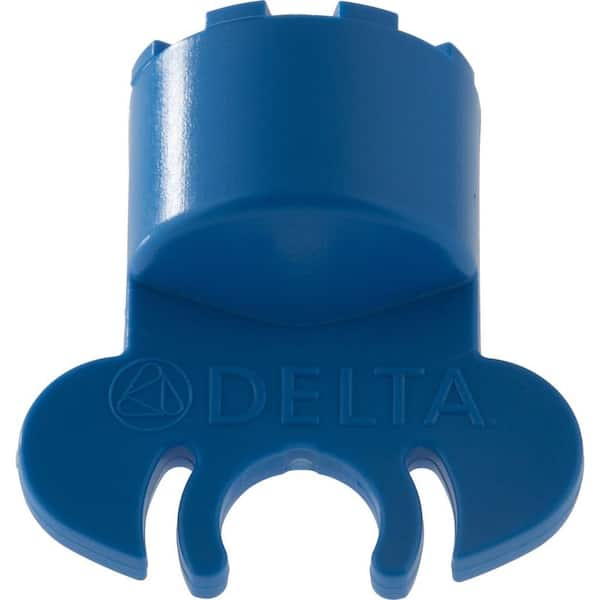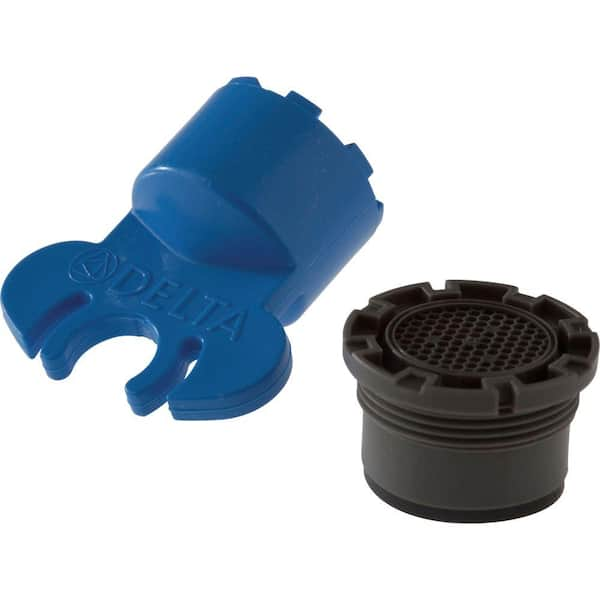Physical Address
304 North Cardinal St.
Dorchester Center, MA 02124
To clean a Delta faucet aerator, unscrew the aerator from the faucet and soak it in a solution of vinegar and water for several hours. Scrub the aerator with a brush to remove any debris and then reattach it to the faucet.
A clean and properly functioning faucet aerator is essential for maintaining the smooth flow of water from your Delta faucet. Over time, mineral deposits and debris can build up in the aerator, causing reduced water flow and pressure. To remedy this, regular cleaning of the aerator is necessary.
In this guide, we will walk you through the simple steps to effectively clean your Delta faucet aerator, allowing you to restore the optimal performance of your faucet and ensure a steady stream of water in your kitchen or bathroom.
Faucet aerators are essential components of your plumbing fixtures that help control water flow and reduce splashing. Over time, mineral deposits and debris can build up in the aerator, leading to reduced water pressure and potential damage to the faucet. Cleaning the aerator regularly is crucial to maintain the efficiency and longevity of your faucet.
Regularly cleaning your faucet aerator helps maintain optimal water flow and pressure. It also prevents mineral buildup, which can lead to corrosion and damage to the faucet components. Clean aerators contribute to water efficiency, reducing the overall water usage and utility bills. Additionally, removing debris and sediment from the aerator ensures cleaner, healthier water for your household.
A dirty faucet aerator can cause reduced water flow and pressure, leading to inconvenience and inefficient water usage. Mineral buildup from hard water can also lead to corrosion and damage, requiring costly repairs or replacements. Furthermore, debris and sediment in the aerator can compromise water quality, impacting the taste and safety of the water used for drinking and cooking.
To clean the Delta faucet aerator, you will need a few essential tools. These tools include an adjustable wrench, white vinegar, and a toothbrush. Each of these tools serves a specific purpose and is crucial for effectively cleaning your faucet aerator.
An adjustable wrench is necessary for removing the aerator from the faucet. This tool allows you to securely grip and unscrew the aerator without causing any damage to it. Ensure that the wrench is adjusted to fit the size of the aerator to avoid slippage and potential damage.
White vinegar is an effective natural cleaning agent that can dissolve mineral deposits and build-up within the aerator. It is an eco-friendly and affordable option for removing limescale and other impurities that may be clogging the aerator, restoring its functionality and water flow.
A toothbrush is useful for scrubbing and dislodging any stubborn debris or mineral deposits from the aerator’s intricate components. The small bristles of the toothbrush can reach the nooks and crannies of the aerator, ensuring a thorough cleaning process.
To clean a Delta faucet aerator, first, unscrew the aerator from the faucet using pliers. Soak the aerator in a vinegar solution to dissolve any mineral deposits. Use a small brush to remove any remaining debris. Reattach the aerator to the faucet, and run water to ensure it’s clean and functioning properly.
Start by turning off the water supply to the faucet. Locate the shut-off valves under the sink.
Use pliers to unscrew and remove the aerator from the end of the faucet spout. Be gentle to avoid damaging it.
Prepare a vinegar solution by mixing equal parts white vinegar and water. Soak the aerator in this solution for 30 minutes.
After soaking, use a small brush to gently scrub the aerator to remove any remaining debris or mineral deposits.
Once clean, reassemble the aerator by screwing it back onto the faucet spout. Test the water flow to ensure it’s clear.

Credit: www.homedepot.com
In order to keep your Delta faucet aerator functioning at its best, it’s important to know how to troubleshoot and resolve common issues that can affect its performance. In this section, we will discuss three common problems that you may encounter with your Delta faucet aerator: low water pressure, clogging problems.
If you’re experiencing low water pressure from your Delta faucet aerator, there could be a couple of reasons for this problem. First, check if the water supply valves are fully open. Sometimes, these valves can accidentally get closed, resulting in reduced water flow. If the valves are open, the next step is to clean the aerator.
Clogging is another common issue that can occur with Delta faucet aerators. If you notice that the water flow is reduced or completely blocked, it’s likely that the aerator is clogged. Here’s how you can clean it:
By following these troubleshooting steps, you should be able to resolve common issues with your Delta faucet aerator, such as low water pressure and clogging problems. Remember to regularly clean and maintain your aerator to ensure optimal performance and a smooth, uninterrupted water flow in your kitchen or bathroom.
Preventative maintenance plays a crucial role in keeping your Delta faucet aerator clean and performing efficiently. Regular cleaning and implementing a water-softening system can help prevent mineral buildup and clogs, ensuring the longevity of your faucet. In this section, we will explore two essential preventative maintenance tips for cleaning your Delta faucet aerator: establishing a regular cleaning schedule and using a water-softening system.
Maintaining a regular cleaning schedule for your Delta faucet aerator is key to preventing mineral buildup and clogs. By adhering to a routine cleaning regimen, you can ensure the continuous flow of water and prolong the lifespan of your faucet. Follow these steps to establish a cleaning schedule:
Implementing a water-softening system can significantly reduce the mineral content in your water supply, minimizing the need for frequent cleaning of your Delta faucet aerator. Hard water, characterized by high levels of minerals such as calcium and magnesium, can lead to mineral buildup and affect the performance of your faucet. Follow these steps to install and maintain a water-softening system:
By incorporating these preventative maintenance tips into your faucet care routine, you can maintain a clean and efficient Delta faucet aerator, ensuring the long-term performance of your kitchen or bathroom faucet. Remember to follow the manufacturer’s instructions and consult a professional plumber if needed.

Credit: www.homedepot.com
Proper maintenance can significantly extend the lifespan of your faucet aerator. By following simple cleaning practices and avoiding harsh chemicals, you can ensure that your aerator functions optimally for a long time.
Regular cleaning and upkeep are essential for prolonging your faucet aerator’s lifespan. Gently remove the aerator from the faucet using pliers to avoid damaging it.
Soak the aerator in a solution of vinegar and water to dissolve mineral deposits. Scrub the aerator with a soft brush to remove debris and buildup for proper water flow.
Avoid using harsh chemicals or abrasive cleaners as they can corrode and damage the aerator. Stick to natural cleaning solutions like vinegar to maintain the aerator’s integrity.
Avoid using harsh chemicals to prevent damage.
To effectively clean a Delta faucet aerator, it is advisable to seek professional help. Their expertise ensures a thorough and optimal cleaning process, preventing any potential damage or complications.
When to Seek Professional Help If you have tried cleaning the Delta faucet aerator and still experiencing persistent issues or noticing unusual sounds or leaks, it may be time to seek professional help. Persistent Issues If cleaning the Delta faucet aerator does not resolve persistent issues such as low water pressure or inconsistent water flow, it is advisable to seek professional assistance. Professional plumbers have the expertise and tools to diagnose and fix complex issues with the faucet aerator that may be beyond the scope of basic maintenance. Unusual Sounds or Leaks Unusual sounds or leaks coming from the faucet aerator after cleaning may indicate a more complex underlying problem. Professional plumbers can identify and address these issues effectively, ensuring that the aerator functions optimally without any disruptions.
Credit: www.deltafaucet.com
Keep your Delta faucet aerator clean for better water flow and quality. Regular maintenance ensures longevity. Follow these simple steps for a hassle-free cleaning process. A clean aerator leads to a healthier and efficient kitchen or bathroom. Remember to clean your Delta faucet aerator regularly for optimal performance.